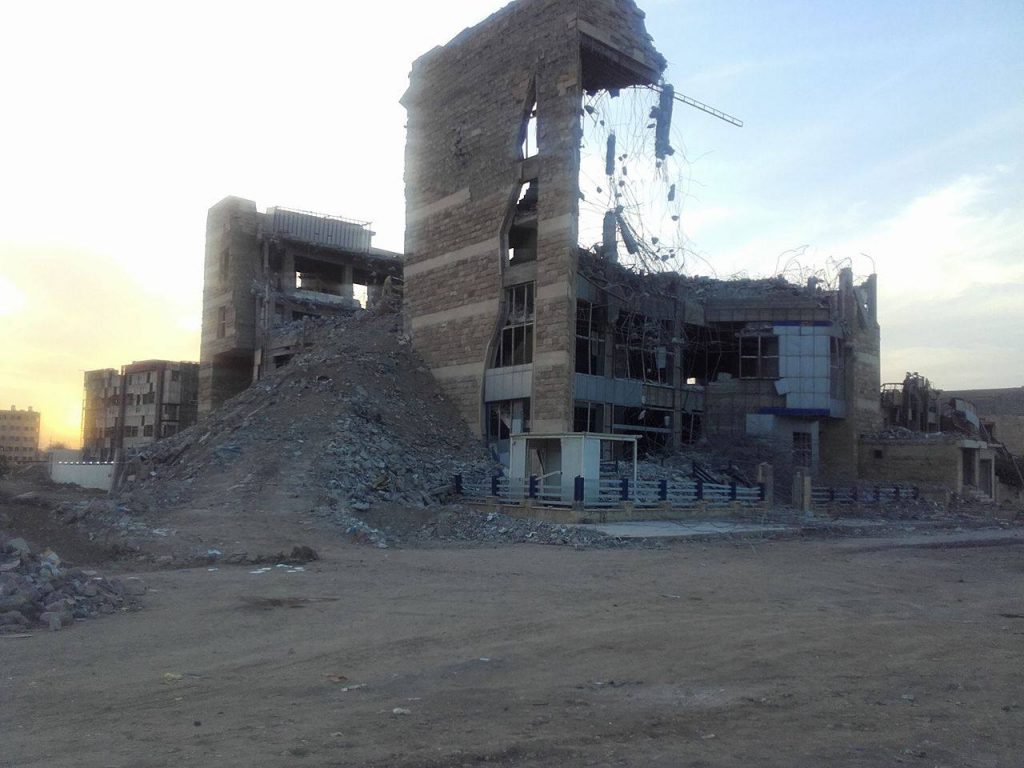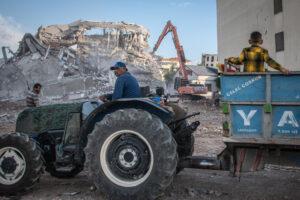Post-ISIS Mosul, pt 2: Home is where the hurt is
By Boštjan Videmšek/DELO
Despite the destruction, pain, trauma and dread for the future, Mosul's tough and long-suffering residents are returning to the ruins of their devastated city.

Image: ©Boštjan Videmšek
Thursday 21 October 2017
Before the offensive to seize back Mosul from the control of the Islamic State (ISIS or ISIL), almost 2.5 million people had been living in Iraq's second-largest city. Since then, over a million have been evacuated, especially from the western Sunni districts. A joint effort by the Iraqi security forces and local humanitarian organisations, this was one of the greatest humanitarian evacuations in human history. The evacuation may have saved a huge number of lives, but hundreds of thousands still lost their homes.
Some 5.8 million Iraqis were driven from their homes after the Islamic State, in 2014, conquered huge and mostly undefended swathes of territory. As things stand, 3.2 million remain displaced, and 600,000 of them are from Mosul.
These people literally have no place to go back to, or they are rightly fearful of returning to the crater that used to be their city, dreading the next wave of violent vengeance – this time of the sectarian variety. During my travels across the refugee camps in northern Iraq, I met numerous people who were actively prevented from returning by the security forces and the Shia militias. In all this chaos, everyone agrees on one thing: Mosul is never going to be itself again.
The western parts of the city remain monstrously empty. Life may be flowing back into the eastern part of town, but west Mosul has been sacrificed. It was clear in advance it was going to be erased. It would be impossible to describe the sheer kinetic force employed to tear down this old and once proudly independent city. The immensity of the destruction can only be grasped first-hand.
Two boys are staring off into space amid the rubble. Not much beside the great absence of things that used to be is on display. It feels like even time itself has died here. The past has been erased, the present is a flat line going nowhere, and no one can imagine anything resembling a tolerable future.
Yet in spite of all this, some of the residents have decided to return. And like the trees that have sprouted up through the cracks in the concrete, these people are now subsisting on crumbs amid the wreckage of their homes. There are no stray dogs to be glimpsed around here. Even the smartest and toughest of alley cats seem to have been eliminated.
During the final weeks of the campaign, a great hunger had descended over west Mosul. People ate whatever they could get their hands on to survive. The Islamic State had confiscated most of the food. What was available was savagely expensive – a kilogram of sugar could set one back as much as $50. In many places, there was no electricity or drinking water. West Mosul, especially its old city centre, had been turned into a constantly bombarded, open-air concentration camp. Caught in the crossfire, the city's inhabitants were slowly turned into yet another tool of war.
“We were very lucky. All of us survived. But we lost everything we had. My son used to have a shop in the old part of town. The entire family was dependent on that shop. Now it is gone. Everything is gone,” described Ahmed Haji Jasim, 70, who had spent the entire offensive here in Mosul. We were talking to him in the spacious and relatively undamaged guest room in his flat in the al-Rifai quarter. Jasim and his family managed to survive thanks to the bunker they had built in the building's basement. During the worst of the bombardment, they didn't leave their hideout for five days. They had to stay put even as they heard most of their belongings above them burning away.
“The worst of it was that we knew we could die at any moment,” the old and tired-looking gentleman told us, sitting under a giant busted clock. “It took such a long time for things to calm down. We were terrified all the time. The food was extremely expensive.”
Before the offensive, Jasim used to be a reasonably well-off man. Now he and his family are facing destitution. “But we're set to remain here. Where else can we go? After 35 years of bloody conflict, I can no longer trust anyone. No, this was not a liberation. It is clear that the future for both Iraq and Mosul is going to be grim.”
Besieged by death
As if everything else they had done was not bad enough, ISIS fanatics, in a crime against the future, had purposefully worked to dismantle the local medical infrastructure. “What you see here is not rebuilding; it is reanimation,” said Hasan Ibrahim, the new managing director of the West Mosul General Hospital, the main hospital in west Mosul, flashing us a rueful smile. Our meeting took place in Ibrahim's improvised office somewhere in the maze of charred walls and gutted recovery rooms, the consequence of the Islamic State's decision to burn the hospital to the ground.
This badly damaged wonder of resilience is currently the only functioning major healthcare institution in the ransacked urban desert. As soon as the Iraqi forces took control of the district on 15 May 2017, the remaining hospital staff took to resurrecting the facilities. With the assistance of the UN's Population Fund (UNFPA) and ECHO, the EU's humanitarian agency, this stupendous project has managed to get off the ground.
“We've seen almost total destruction of the premises,” Ibrahim continued. “ISIS took out all our equipment. The demand for our services is staggering. As we re-entered the hospital, the fighting was still going on. Right here, very, very close to us. It was terrifying.”
The hospital's managing director still serves as an active surgeon. In the past, he had been arrested four times by ISIS thugs. He had been put on trial twice. The first time because his trousers were too long, the second time, because they were deemed too short after he had dutifully shortened them. This is not a joke. But Dr Ibrahim still managed to laugh as he recounted the story. He was also quick to add he had been exceptionally lucky to escape unharmed.
“For the last two months, we functioned as an ER unit. It was horrible, just horrible… Even before all this madness, our staff hadn't been receiving their paychecks for three years. I can tell you, they're not receiving them now, but they're still performing their duties with exemplary dedication.”
As things stood, 25 people were 'employed' at the hospital. After our interview, the managing director led us up a flight of soot-streaked stairs for a tour of the hospital's burnt-out upper floors. We ended up on the roof, from where one could survey the totality of west Mosul's devastation.
The main and only hospital in west Mosul is doing what it can to help some life persevere amid the rubble. The hospital's underground facilities may be in dire need of complete renovation, but that has not stopped the staff from using it as an improvised maternity ward. Opened at the beginning of June 2017, it was allocated a team of one doctor and two midwives.
During our visit, the modest premises, which were reminiscent of the field hospitals of yore, were a hive of lively activity. It wasn't yet noon, and the world was already two infant souls richer. That morning, Suria Shaab Ahmad, 42, had given birth to the little girl she was now clutching to her breast on her bed.
It was her fifth child. “Five is enough,” Suria laughed merrily in spite of her apparent exhaustion, a mere two hours after the delivery. Then she told me she had been escorted to the hospital by her 62-year-old mother. Suria's husband had simply disappeared – or, much more probably, been disappeared… Like hundreds of other Sunni men who had vanished without a trace.
“We come from the Bousefa quarter in west Mosul,” Suria's mother informed, as she sat patiently next to her daughter and her tiny granddaughter. “Thirteen months ago when the offensive started, we were forced to run. Our house had been burned down. Everything we owned had gone up in flames. We moved to the old city centre.”
Grandma had, herself, brought six children into the world. Five of them are still alive – only her son Mohammed, a member of the Iraqi army, had been gunned down by the extremists. His family searched for him for a long time. He had been hiding in a hole under the house that Suria's family had fled to. “It was horrible… They had killed my son and burned down that house as well. Following the liberation, we returned to Bousefa to live in a house where Daesh supporters used to live. Where else were we supposed to go?”
Suria's mother spoke in a forceful, seemingly unruffled manner. But then she could hardly afford to seem ruffled. This robust matronly lady knew very well, as I was also aware, that the survival of an entire family hinged on her fortitude.
“Today is a nice day. We are happy. Life is starting over again. I'm trying to find a name for my little girl. Perhaps you've got a suggestion?” Suria Shaab Ahmad asked me.
Nur? Light?
“Ha ha, that's going to be tough – we already have four girls named Nur in the family,” Suria smiled and kept stroking her precious newborn daughter.
Still and in spite of everything, let there be Light.


